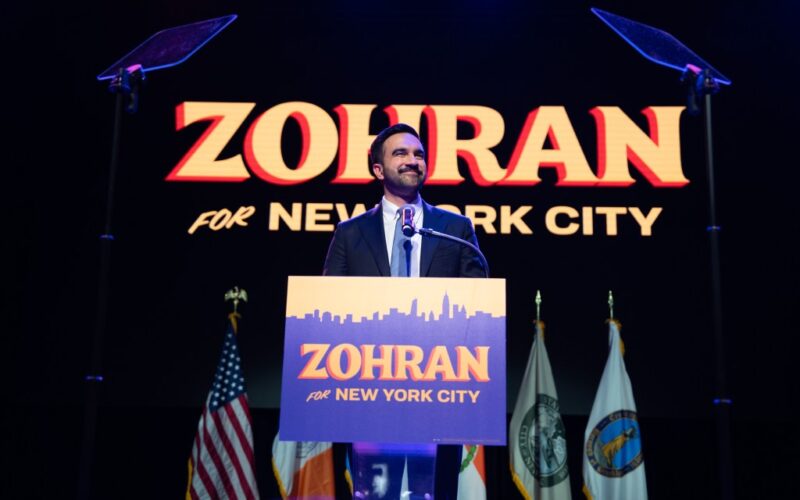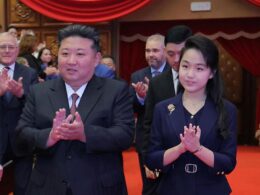Reona Alam, a Muslim student at Hunter College and the daughter of Bengali immigrants, first learned mayor-elect Zohran Mamdani was running to lead New York City about a year ago on social media.
She didn’t think much of it. Feeling hopeless about politics after President Trump was re-elected, Alam was excited to hear that a South Asian and Muslim candidate was in the local race but assumed he wasn’t going to win.
“I’ve been proven wrong,” said Alam, 19, of the Bronx.
When Mamdani is sworn in as mayor in January, he’ll be the first Muslim and South Asian New Yorker to lead a city that’s home to the largest Muslim population in the United States and an increasingly politically active coalition of South Asian voters. The election of the city’s youngest mayor in over a century has resonated particularly with South Asian and Muslim young people, who said they were moved by the success of a candidate who didn’t apologize for who he was.
“The conventional wisdom would tell you that I am far from the perfect candidate,” Mamdani, 34, said during his victory speech at the Brooklyn Paramount theater on Tuesday. “I am young, despite my best efforts to grow older. I am Muslim.”
“Most damning of all, I refuse to apologize for any of this,” said the mayor-elect, a Uganda-born Indian American.
Barry Williams/ New York Daily News
Zohran Mamdani supporters gather outside his election night party at the Brooklyn Paramount on Tuesday. (Barry Williams/ New York Daily News)
Throughout the campaign, Alam, a youth leader alum with the Coalition for Asian American Children and Families, said she watched Mamdani’s videos, including an explainer of ranked-choice voting in Bangla, the language she grew up speaking. He visited dozens of mosques and delivered a poignant, 10-minute address on Islamophobia in the final stretch of the race.
On Election Night, Alam sat at her bedroom desk refreshing the results, unable to focus on her school work. When the race was called for Mamdani, she shared the news with her immigrant parents. She relished in his victory speech as he shouted out communities of color that helped elect him, from Uzbek nurses to Ethiopian “aunties.” He name-dropped India’s first prime minister, and called his wife “hayati,” an Arabic term of endearment. As he finished his remarks, he walked offstage to an iconic Bollywood song.
“In New York especially after 9/11, there was always a lot of racism and Islamophobia surrounding brown people,” said Alam, a Manhattan Center for Science and Mathematics graduate. “There was a lot of racist and Islamophobic rhetoric around his campaign. But his victory … it just inspired me to be more vocal about my identity.”
“New Yorkers,” she added, “fought back against that rhetoric.”
In the week following Election Day, classrooms across the city talked over the results. About one in every 10 children in local schools is estimated to be Muslim.
Amelia Azad, 16, of Midwood, Brooklyn, had exams to study for, so it wasn’t until the next morning that she learned of Mamdani’s win, by way of subway posters that some straphangers had hung up overnight. In school, Amelia, who is Muslim and Bangladeshi, and her classmates watched part of his victory speech in AP government, and discussed their hopes for his mayoralty.
“We were saying, how, you know, he’s so South Asian! It’s nice,” said Amelia. “From the very beginning of his campaign, he would wear traditional clothing. That was just part of him.”
According to exit polls, 87.2% of South Asian voters cast their ballots for Mamdani, especially young people. While 10% of all Asian Americans surveyed were first-time voters, that figure jumped to 20% for those ages 18 to 29.

Amelia and her younger sister, Amira, had even crossed paths with the Queens assemblyman when he met with Bangladeshi voters before the primary.
Amira, at age 9, was already familiar with some of Mamdani’s key policy planks: free buses and bringing down the price of halal food: “We might have less price for bus,” she said. “Maybe he would take the food in public schools, they would change it to a lot of halal food. Because there’s not as much halal food in public schools.”
The elementary school student, who recently won her student council election on the promise of a swing set, is hoping to follow in the footsteps of the first Muslim and South Asian mayor-elect.
“I also get ideas, and I try to do the idea,” she said. “Just like Zohran does.”








